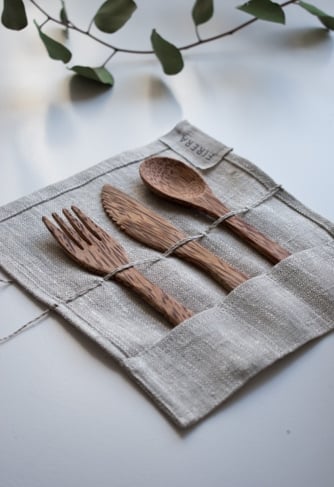
If we continue at our current rate, scientists estimate there will be more plastic than fish (by weight) in our oceans by the year 2050. And sadly, recycling is a poor solution, as only 9 percent of plastic gets recycled worldwide.
Looking for a way to be more eco-friendly (as well as save some money and live healthier)? Join the Zero Waste movement! Here’s how to get started.
Find what works for you
Going Zero Waste is a personal journey. It’s important to keep in mind that the following tips are not the only Zero Waste changes you can make, and not every change will work for every person. Maybe you love DIYs, or maybe you’d rather buy premade plastic-free products. Either way, you’ll find something that’s easiest and best for you.
Follow the waste hierarchy
Many of us focus on recycling, but recycling should really be seen as a last resort. Instead, follow “waste hierarchy”: rethink/redesign, reduce, reuse, recycle, and rot (compost). Other great “Rs” to follow: repurpose, repair, and refurbish.
Use it up!
Don’t toss your old products to buy flashy new “eco-friendly” ones: doing so would defeat the purpose. If you’d like, research where and how to buy/make the replacement you’d eventually like.
Learn your recycling rules
Researching your municipality’s system (everywhere is different) so you can responsibly deal with waste that you do obtain and know how to choose the best options for packaging based on your unique situation.
Practice your refusal skills
Who needs all of that free swag? Practise your refusal skills: say “no thanks!” to shopping bags, receipts, straws, free promotional items, and anything else you do not need. Also consider removing yourself from junk mail lists.
Pack an on-the-go kit
Don’t leave home without your trusty Zero Waste kit! Consider adding a reusable straw, cutlery, napkin/cloth, chopsticks, travel mug, and/or a water bottle. There’s no need to buy new—use what you have on hand.
Go Zero Waste in the bathroom
Here, it’s all about making a sustainable swap each time you need to buy something new. Consider recycled paper or bamboo toilet paper; solid soap, shampoo, and conditioner (or liquid refills); handkerchiefs instead of tissues; and a bamboo toothbrush, compostable floss, and toothpaste powder or tabs. You may also wish to try a metal safety razor with recyclable blades, and reusable menstrual products (such as cloth pads, a menstrual cup, or period underwear).
Go Zero Waste in the kitchen
The sustainable swaps continue! Try out wax food wraps or cloth bowl covers instead of plastic wrap, cloths/rags instead of paper towels, and cloth napkins instead of paper. You may also wish to examine your diet: if possible, reduce your intake of meat, dairy, and seafood, as these are typically very resource-intensive, and opt for local, seasonal, and organic products when possible. Bonus points for reducing food waste and composting!
Shop smarter
Just a wee bit more effort at the store can pay off big-time. Pack up your containers (such as glass jars for wet items and cloth bags for dry items) and research a refill store near you. You can also choose unpackaged foods from the bulk section, bakery, and deli section/butcher of your current favourite shops.
Repair before replacing
Here’s a tip that will help the environment—and often your wallet too! Instead of replacing something, consider:
- sewing or needlework (darn socks, fix a button, or try visible mending)
- fixing a small appliance (learn from a pro!)
- taking shoes to a cobbler
- getting electronics repaired by a professional
Try DIY projects
Now’s your chance to try out something new! Start by making a food staple you’d normally buy, such as waffles, crackers, bread, salsa, granola, or salad dressing. You can also make your own cleaning products with simple ingredients, such as white vinegar or castile soap. Finally, for a fun and exciting challenge, learn a new skill, such as knitting, sewing, gardening, canning, fermenting, woodworking, or soapmaking.
Shop secondhand
When it’s time to buy something, ask yourself if there’s an option for buying used. This can be ideal for clothing, toys, vintage home goods, and more. Not sure where to look? Consider looking at thrift stores, online groups, and consignment shops.
Rethink gifts
For birthdays, holidays, and other gift-giving occasions, consider giving experiences or second-hand gifts, or contributing to a cause. Then wrap with repurposed materials (such as newsprint) or reusable fabric (such as a fabric scarf).
Don’t get discouraged
Sticking with it is the final and most important tip! In the words of Anne-Marie Bonneau (a.k.a. The Zero-Waste Chef), “We may never reach the zero in “zero waste” but that’s no reason to take zero action.





